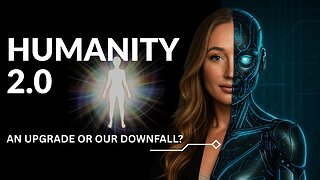Premium Only Content

'For the New Intellectual' (1961) by Ayn Rand
Ayn Rand’s, 'For the New Intellectual' is not a conventional book. It’s part philosophical manifesto, part anthology, and part battle cry for the birth of a new kind of thinker: the intellectual who defends reason, individualism, and capitalism against what Rand calls the cultural “cult of moral decay.” Bold, sweeping, and often polemical, this work serves both as an introduction to Rand’s Objectivist philosophy and as a declaration of war on the prevailing ideas of 20th-century collectivism, mysticism, and self-sacrifice.
At its core, 'For the New Intellectual' argues that Western civilization is dying—not from lack of material wealth, but from a spiritual and philosophical vacuum. Rand’s diagnosis is stark: thinkers have betrayed reason, artists have celebrated suffering, and society has embraced second-handedness and altruism as virtues. In their place, she proposes a new archetype: the “New Intellectual,” someone who is unapologetically rational, egoistic, and pro-capitalist.
The book is structured in two parts. The first is an original essay—the titular “For the New Intellectual”—where Rand lays out her central philosophical claims. She posits that history has been driven by a fundamental conflict between two types: the “Attila” (who rules by brute force) and the “Witch Doctor” (who rules by irrational mysticism). Rand claims that both are parasites who prey on producers—the rational, productive creators she champions. Only a New Intellectual, armed with reason and a commitment to individualism, can challenge them.
The second part is a series of excerpts from Rand’s novels—We the Living, Anthem, The Fountainhead, and Atlas Shrugged. These selections showcase her fictional heroes—Leo Kovalensky, Equality 7-2521, Howard Roark, and John Galt—each embodying the values Rand holds sacred. Through their speeches and monologues, the reader encounters her philosophy in dramatized form, lending emotional force to abstract principles.
Strengths
Rand’s greatest strength lies in her ability to write with conviction and clarity. Whether one agrees with her or not, it’s hard to ignore the intellectual rigor and passionate intensity she brings to the table. She forces the reader to grapple with big questions: What is the role of reason in human life? Is self-sacrifice truly a virtue? Should morality serve the individual or the collective?
Another merit of the book is its unflinching moral vision. Rand does not hedge, compromise, or equivocate. In an age of moral relativism and diluted language, her black-and-white worldview can feel refreshingly—or jarringly—direct.
Weaknesses
That said, 'For the New Intellectual' is not without flaws. It assumes the reader is sympathetic to Rand’s conclusions or at least familiar with her fiction. The excerpts from her novels, while powerful in their original context, can feel disjointed when presented as standalone declarations. Moreover, her tone can border on the shrill, particularly when she engages in blanket condemnations of past philosophers, religions, or political systems.
Critics have long noted her tendency to caricature opposing views, reducing complex ideologies to straw men. Her dichotomy of reason versus mysticism, or producer versus looter, often overlooks nuance. Additionally, her rigid individualism leaves little room for the messiness of human interdependence, empathy, or cultural heritage.
Conclusion
'For the New Intellectual' is not a neutral philosophical treatise—it is a call to arms. Rand doesn’t merely want to persuade you; she wants to convert you. The book’s combination of polemic and drama gives it a unique place in American intellectual history. Whether one sees it as a work of genius, propaganda, or philosophical fiction, its impact is undeniable.
If you are intrigued by radical individualism, if you feel disillusioned by cultural conformity, or if you’re simply curious about one of the 20th century’s most controversial thinkers, this book is a provocative—and unapologetically ideological—starting point.
-
 1:11:31
1:11:31
Flyover Conservatives
11 hours agoThe “J Walker” Secret: One Daily Habit That Shifts an Entire City - Tammy Hotsenpiller | FOC Show
42.7K2 -
 2:12:02
2:12:02
Mally_Mouse
8 hours ago🎮Throwback Thursday! Let's Play: Wii Sports Resort!
38.1K2 -
 LIVE
LIVE
Akademiks
4 hours agoATLANTA IS BACK. Young Thug and YFN best buddies now. ATL backs Thug officially!
1,244 watching -
 5:40:35
5:40:35
Reolock
6 hours agoWoW Classic Hardcore | 3 LEVELS REMAIN
36.8K3 -
 3:00:23
3:00:23
Sgt Wilky Plays
5 hours agoThirst Trap Thursday | Regiment Donor Drive
31.2K -
 4:12:29
4:12:29
Fragniac
6 hours ago🔴 LIVE - FRAGNIAC - THE FINALS - IT'S ABOUT TO BE A MOVIE❗🎬📽 🎞
23.9K2 -
 1:39:44
1:39:44
Glenn Greenwald
7 hours agoJames Comey Indicted; TikTok and CBS Taken Over by IDF Funder Larry Ellison; Republicans Blame Rhetoric for Violence: Is "Stochastic Terrorism" Real? GOP Blocks Release of Epstein Files | SYSTEM UPDATE #521
143K81 -
 LIVE
LIVE
StevieTLIVE
5 hours agoThursday SOLO Warzone Domination | BDAY at Midnight
28 watching -
 10:34:47
10:34:47
FoeDubb
11 hours ago🏰KINGDOM MENU: 🎮WASTELAND SHENANIGANS ON DA 1ST BORDERLANDS DILLY DILLY!!!!
8.17K -
 15:57
15:57
Robbi On The Record
8 hours ago $0.54 earnedTranshumanism: Are Humans Becoming Obsolete? Neuralink & CRISPR explained
12.1K5